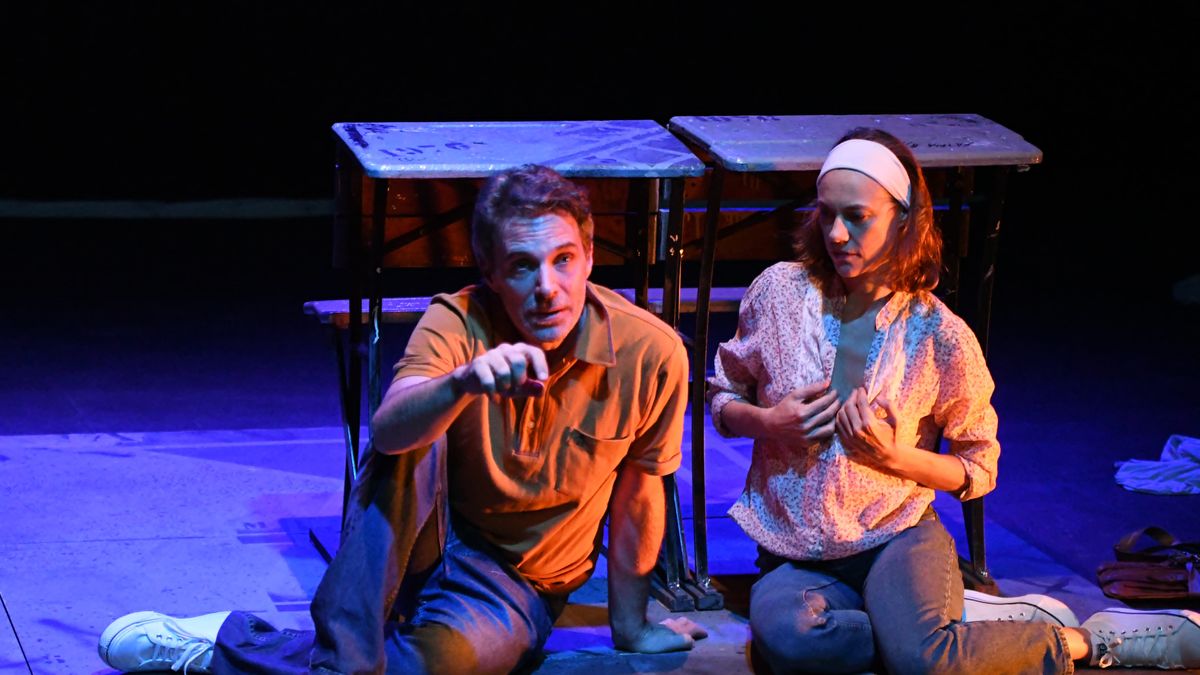“Cultural policy is far from allowing the public to approach theatre with a capital T, authorial theatre, where economic results are not important but rather those that have to do with intellectual and spiritual formation,” says Marcelo Moncarz, director of “600 grams of oblivion”, of Daniel Dalmaroni, starring Nelson Rueda and Alexia Moyano, which was revived last night at the Teatro del Pueblo, Lavalle 3636, with performances on Mondays at 8 pm.
After its successful first season, the play was re-released to tell a love story of two teenagers in the turbulent 70s in La Plata. They drink smoothies, watch movies, read everything they can get their hands on and weave a story of militancy. It features music by Tom CL and set and costume design Alexander Matthew. We talked with Moncarz.
Journalist: What attracted you to Dalmaroni’s text that made you want to bring it to the stage?
Marcelo Moncarz: Nelson Rueda approached me about it. I have always been interested in Dalmaroni’s writing and this work turned out to be the ideal opportunity to be able to work with Nelson after so many years of trying and failing. The entire text is attractive and especially theatrical. It is his way of writing that captivated me. It tells a very special historical moment in our country, through a love story between two teenagers in La Plata in the 1970s.
Q: How did you think about the staging and the artistic areas?
MM: I strongly believe that the final result of a theatre project is teamwork, and for this reason I worked with Alejandro Mateo on the set design and costumes for this piece. We started by looking for a floor that had a map of the city of La Plata, on which the entire show takes place. The main elements are two desks, which serve as support for the actors to tell the passage of time. We move from scene to scene with these benches that mutate and transform into the different spaces that tell each moment. It was important to portray the 70s in terms of colors, designs and textures that defined an era, that decade was very rich in terms of visual image and costumes. The music was worked from well-known songs and “Melody” was a source of inspiration for the main leitmotif. The innocence, tenderness and love of that film was what we were looking for to portray the love of the protagonists in an original way.
Q: What themes does the work address?
MM: First love, the one that stays in our souls for life, the teenage love that leaves its mark on us and that, seeing it from adulthood, makes us remember that tenderness and innocence. The history of our country, what happened to so many young people in the 70s and the dictatorship. This work addresses the love story in that context because both topics are interconnected. With this work, Dalmaroni evokes part of his personal life.
Q: What is it like to bet on a re-release in the independent industry today?
MM: Doubly significant because of the situation we are going through at every level. Betting on theater today is an act of resistance, doing this play is. The meaning of doing this material today is not the same as two years ago, when this play arrived. We are happy to be able to re-release it and the advantage is that we already did it and the public liked it, we had support, so that uncertainty that one has when it premieres is no longer there now. The success or failure of a play is fortuitous, so re-releasing something that has been tested, that worked and that we had to reduce due to the actors’ schedules, makes us happy.
Q: How do you see theatre and culture today?
MM: There is a government that is subjugating culture, an absolute anti-cultural State policy that does not support theatre, a particular type of theatre. Where can I find great authors and casts if not in public theatre? Where are those texts that brought me closer to theatre as a child? There is no way to do them economically. Theatre has an absolutely formative value in terms of who we are as human beings. In theatre there are the great questions, the great themes, theatre serves to question ourselves, to encounter memory, and allows us to stay alive, at least to me, theatre continues to seem to me to be one of the most original and beautiful spaces that connect me with the beauty of life and with the soul.
Source: Ambito
I am a 24-year-old writer and journalist who has been working in the news industry for the past two years. I write primarily about market news, so if you’re looking for insights into what’s going on in the stock market or economic indicators, you’ve come to the right place. I also dabble in writing articles on lifestyle trends and pop culture news.




